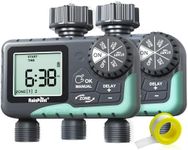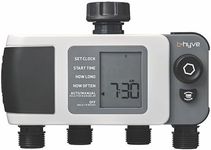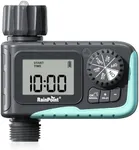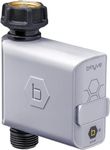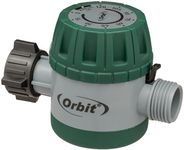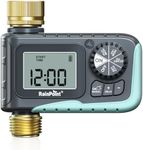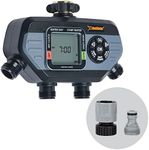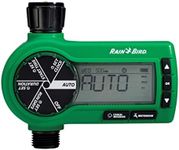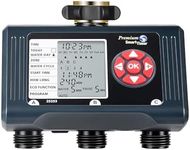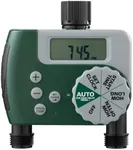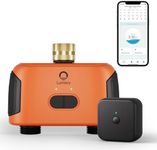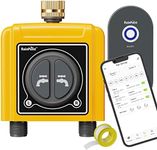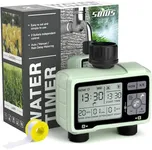Buying Guide for the Best Garden Water Timer
Choosing the right garden water timer can make a significant difference in maintaining a healthy and beautiful garden. A water timer automates the watering process, ensuring your plants get the right amount of water at the right time, even when you're not around. To pick the best garden water timer for your needs, consider the following key specifications and how they align with your gardening requirements.Number of ZonesThe number of zones refers to how many separate areas or sections of your garden the timer can control independently. This is important because different plants may have different watering needs. If you have a small garden or a single type of plant, a timer with one zone may suffice. For larger gardens with diverse plant types, a timer with multiple zones allows you to customize the watering schedule for each area, ensuring optimal care for all your plants.
Programming OptionsProgramming options determine how flexible and customizable the watering schedules can be. Basic timers may offer simple daily or weekly schedules, while advanced models provide more detailed programming, such as multiple start times, specific days of the week, and even seasonal adjustments. If you have a straightforward watering routine, a basic timer will do. However, if you need precise control over watering times and frequencies, especially for different plant types or weather conditions, look for a timer with advanced programming capabilities.
Power SourceGarden water timers can be powered by batteries, solar energy, or a direct connection to an electrical outlet. Battery-powered timers are easy to install and portable, but you'll need to replace the batteries periodically. Solar-powered timers are eco-friendly and reduce the need for battery replacements, but they require sufficient sunlight to function effectively. Electric timers offer consistent power but may require more complex installation. Choose a power source that fits your garden setup and maintenance preferences.
Watering Duration and FrequencyThis specification refers to how long and how often the timer can water your garden. Some timers allow for short durations and frequent watering, which is ideal for delicate plants or seedlings. Others support longer durations and less frequent watering, suitable for established plants or lawns. Consider the specific needs of your plants and how often they require watering to select a timer that offers the appropriate duration and frequency settings.
Weather SensorsWeather sensors can detect rain, soil moisture, or temperature and adjust the watering schedule accordingly. This feature helps conserve water and prevents overwatering, which can be harmful to plants. If you live in an area with variable weather conditions, a timer with built-in weather sensors or compatibility with external sensors can be very beneficial. It ensures your garden receives the right amount of water based on real-time weather data.
Ease of UseEase of use encompasses the user interface, installation process, and overall operation of the timer. Some timers come with digital displays and intuitive controls, making them easy to program and adjust. Others might have more complex settings that require a bit of a learning curve. If you're not tech-savvy or prefer straightforward operation, look for a timer with a simple, user-friendly design. Additionally, consider how easy it is to install the timer in your garden setup.
Durability and Build QualityDurability and build quality are crucial for a device that will be exposed to outdoor elements. Look for timers made from high-quality, weather-resistant materials that can withstand sun, rain, and temperature fluctuations. A durable timer will last longer and require less maintenance, providing reliable performance over time. If your garden is in an area with harsh weather conditions, investing in a robust, well-built timer is essential.
